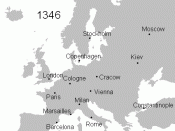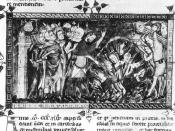The Renaissance age was a period characterized by a change toward a flowering economy; less religious society; appreciation of the arts; education; government; rebirth in man; and human emphasis on their uniqueness, capabilities, and achievements. All of the changes to Renaissance characteristics were stimulated by the Great Schism's, Hundred Years War's, and the Black Death's effect - population loss, nationalism, higher per capita, and secularism. Those effects - which in general created a secular society, and higher wealth - were the main fuel for the Renaissance movement. Secularism allowed people to do whatever they want, even beyond the boundaries of religious restraints. With the combination of higher wealth - due to population loss - and secularism, more leisure materials could be enjoyed, hence the rebirth with art appreciation. Religious teachings taught that modesty was a virtue, however, with secularism humans started to put religious virtues aside, and headed in the opposite direction.
Their individualism, and personal achievements were valued and encouraged instead. Generally speaking, the effects of the three events in the fourteenth century sparked the fuse for the Renaissance.
The first and foremost catalyst for the Renaissance was the Black Death. Begining in 1348, the disastrous plague's spread was facilitated by large scale commerce. Europe's population declined sharply from the plague. The large amount of the people killed caused a labor shortage. Fortunately for some, prosperous windows of opportunities were opened because of the shortage. There was a great demand for hands in the field. Peasants, aware of the labor situation, took advantage by demanded higher wages. Slavers were in business to help meet the labor demand. Population loss thus created higher per capita wealth for some, average peasant wages rose, and slaver's profits were enormous. In turn this higher wealth allowed some to have a more comfortable...


